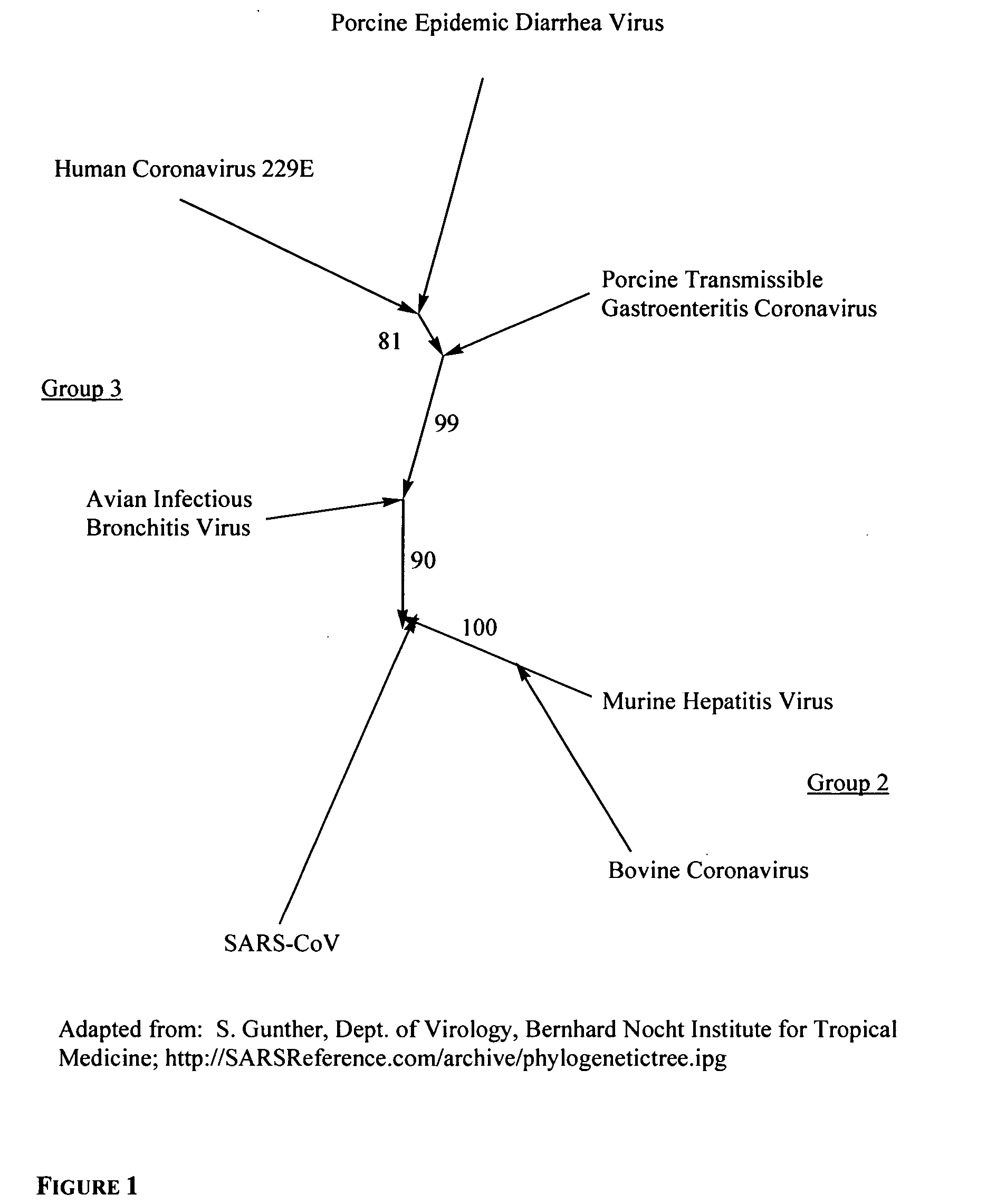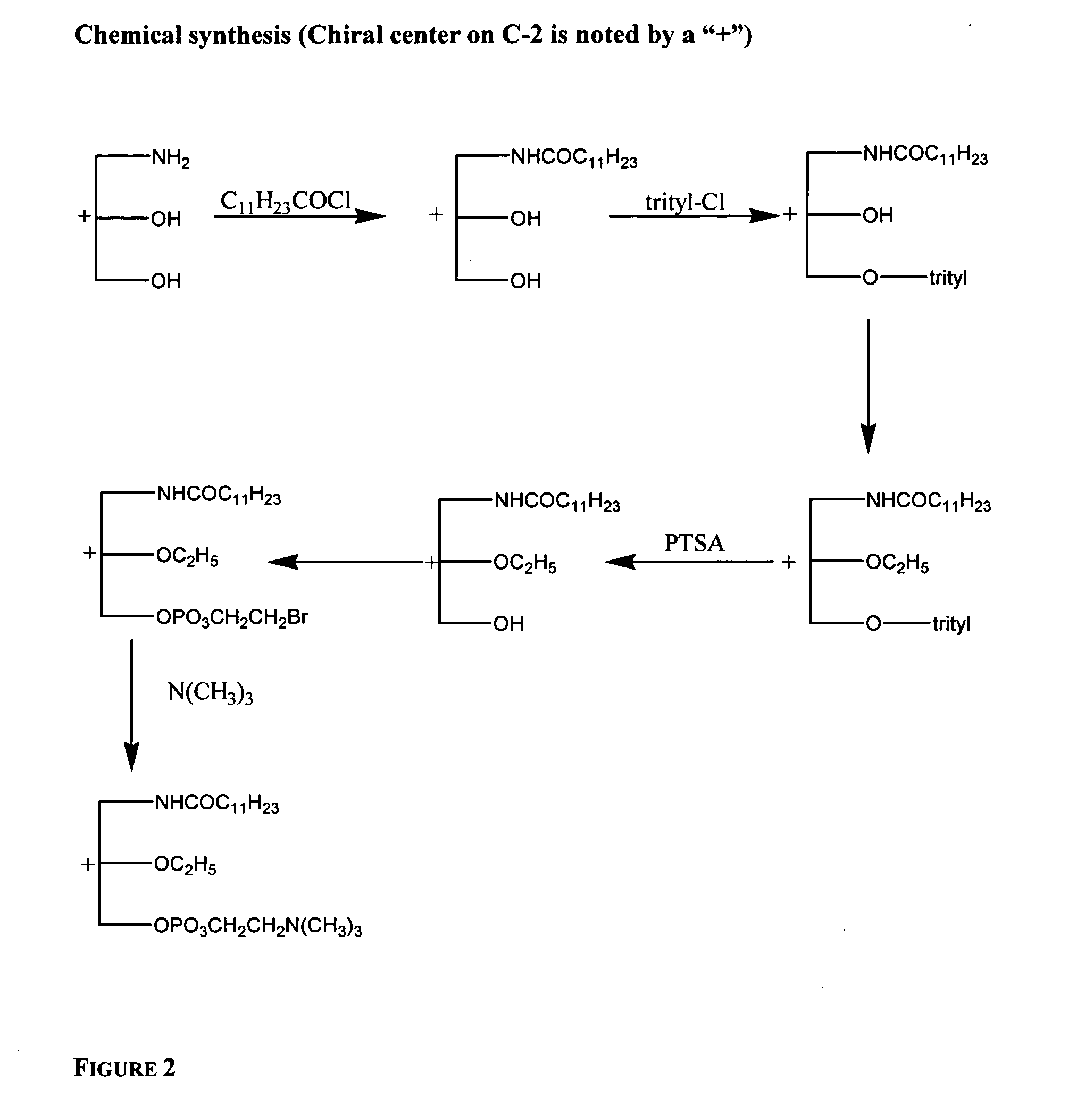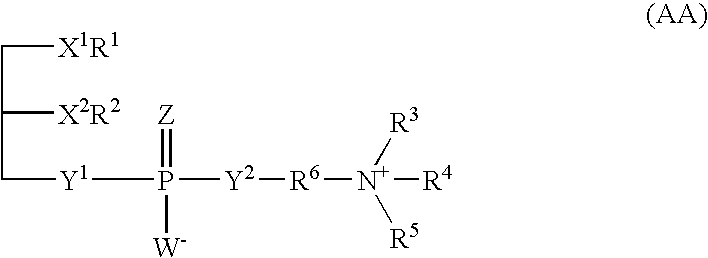Phospholipids for the treatment of infection by togaviruses, herpes viruses and coronaviruses
a technology of phospholipids and coronaviruses, which is applied in the direction of phosphorous compound active ingredients, biocide, animal husbandry, etc., can solve the problems of ineffective targeted pharmaceutical agents for treating humans infected with sars cov, ineffective ribavirin alone in reducing viral rna levels, and difficult differentiation of sars from other viral infections in its early stages
- Summary
- Abstract
- Description
- Claims
- Application Information
AI Technical Summary
Benefits of technology
Problems solved by technology
Method used
Image
Examples
example 1
Anti-SARS CoV Activity
[0730] The ability of active compounds to inhibit the SARS CoV was determined using a neutral red assay. Vero cells were infected with the Urbani strain of SARS CoV. Serial concentrations of test compound were incubated in the presence of the infected cells. Cell survival was quantitated by staining of live cells with a neutral red solution. Toxicity was determined by incubating uninfected Vero cells in the presence of serial concentrations of the test compound.
50% Endpoint (μM)Effective Conc.InhibitoryCmpd:(EC50) AgainstCone. (IC50)R1 R2R3SARS CoVCell GrowthSIaNHCOC11H23OC3H6CH3PCb3 μg / mL40 μg / mL13
aSI = Selectivity Index (IC50 Cell Growth divided by EC50).
bPC = Phosphocholine [OPO3−CH2CH2N+(CH3)3]
example 2
Anti-Varicella Zoster Virus Activity
[0731] The ability of active compounds to inhibit the varicella zoster virus was determined using a CPE (virus-induced cytopathic effects) inhibition assay. Human foreskin fibroblast cells were infected with varicella zoster virus. Serial concentrations of test compound were incubated in the presence of the infected cells. The CPE reduction of the virus-infected wells and the percentage cell viability of uninfected drug control wells were determined. The EC50 and the TC50 were calculated.
50% Endpoint (μM)EffectiveConc.Compound:(EC50)cInhibitoryAgainstCone. (IC50)R1 R2R3VZVCell GrowthSIaNHCOC9H19OC9H18CH3PCb0.48 μg / mL75 μg / mL156
aSI = Selectivity Index (IC50 Cell Growth divided by EC50).
bPC = Phosphocholine [OPO3−CH2CH2N+(CH3)3]
example 3
Preparation of Pharmaceutical Compositions
[0732] Alkylamidophosphocholine compounds are synthesized as described in Ouyang et al., J. Med. Chem., 45:2857-2866 (2002), U.S. Pat. No. 5,614,548, U.S. Pat. No. 5,962,437, or U.S. Pat. No. 5,770,584.
[0733] In particular, the 3-alkylamido-2-alkoxypropylphosphocholine is obtained by reacting commercially available 3-amino-1,2,-propanediol with the appropriate acid halide, such as an acid chloride, and / or anhydride. The primary alcohol is protected, and the secondary alcohol is alkylated, for example with an alkyl halide, such as an alkyl bromide. The primary alcohol is deprotected and reacted with a 2-haloalkyl dihalophosphate, such as 2-bromoethyl dichlorophosphate, and a base, such as trimethylamine, to obtain the 3-alkylamido-2-alkoxypropylphosphocholine compound.
[0734] 3-dodecylamido-2-ethoxypropylphosphocholine is synthesized as shown in FIG. 2, and as described in Ouyang et al. FIG. 2 describes the chemical synthesis of R, S, and r...
PUM
 Login to View More
Login to View More Abstract
Description
Claims
Application Information
 Login to View More
Login to View More - R&D
- Intellectual Property
- Life Sciences
- Materials
- Tech Scout
- Unparalleled Data Quality
- Higher Quality Content
- 60% Fewer Hallucinations
Browse by: Latest US Patents, China's latest patents, Technical Efficacy Thesaurus, Application Domain, Technology Topic, Popular Technical Reports.
© 2025 PatSnap. All rights reserved.Legal|Privacy policy|Modern Slavery Act Transparency Statement|Sitemap|About US| Contact US: help@patsnap.com



